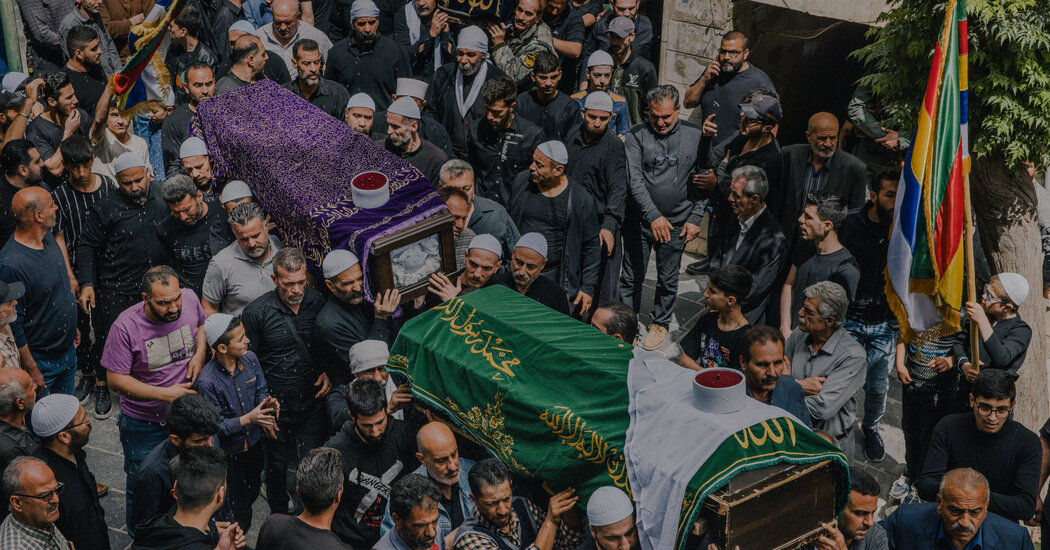Israel launched airstrikes on Syria on Wednesday and threatened to strike government forces there if clashes persisted between pro-government fighters and militiamen from the Druse minority.
Wading into the latest eruption of sectarian violence in the country, the Israeli military said its aircraft had struck a group of “operatives” accused of having “attacked Druse civilians” in spreading violence around the outskirts of the capital, Damascus.
It did not identify the operatives, but pro-government Islamist fighters have been locked in fierce clashes in the area with Druse militiamen for two days. Earlier, the Israeli government said its forces had targeted members of an unidentified “extremist group” south of Damascus.
Israel is home to a substantial Druse community, many of whom see themselves as loyal citizens and serve in the military.
At least 39 people — including 22 on Wednesday — have been killed in two days of clashes between Syrians on the outskirts of Damascus, according to the Syrian Observatory for Human Rights, a war-monitoring group based in Britain.
The Israeli airstrikes on Wednesday came after violent clashes broke out around the town of Ashrafieh Sahnaya, a largely Druse area south of Damascus.
The attacks on areas around Damascus with large Druse populations began overnight Monday into Tuesday after an audio clip circulated on social media purporting to be a Druse cleric insulting the Prophet Muhammad. The cleric denied the accusation, and Syria’s Interior Ministry said that its initial findings showed that he was not the person in the clip.
The violence is stoking fears among Syria’s diverse ethnic and religious minorities who have grown increasingly worried about persecution under the rule of Syria’s new Islamist leaders, who overthrew the dictator Bashar al-Assad in December.
The latest wave of sectarian violence began in the predominantly Druse city of Jaramana. By the end of Tuesday, 17 people had been killed.
The unrest spread into Wednesday to Ashrafieh Sahnaya, where Druse militia fighters battled “forces affiliated to the ministries of defense and interior and other proxy forces” of the government, according to the war monitoring group.
Abu Hassan, a Druse militia commander in the southern Syrian city of Sweida who goes by a nom de guerre, said foreign fighters and other extremist militants nominally affiliated with the government had been involved in the attacks on Druse areas. He also suggested that the audio clip had been a faked pretext for the violence, saying this was really about settling old scores in the aftermath of Syria’s nearly 14-year civil war.
The Interior Ministry did not respond to a request for comment.
Regarding the clashes on Wednesday, the state news agency, SANA, said armed gunmen — an apparent reference to the Druse fighters — had attacked checkpoints and vehicles overnight belonging to government forces in Ashrafieh Sahnaya.
An Interior Ministry official called the gunmen who attacked government forces “criminals” and vowed that the government would strike back “with an iron fist,” according to SANA.
Israel’s first airstrike on Wednesday was described as a warning against “an extremist group” said to be preparing to attack Druse, according to a joint statement by the Israeli prime minister’s office and the defense minister.
Israel has offered to protect the Druse in Syria should they come under attack amid the tumultuous transition of power in the country. Many Syrian Druse have rejected that offer, however, denouncing what they consider potentially destructive foreign meddling.
Syria is a predominantly Sunni Muslim nation, while the Druse are a religious group that practices a secretive religion rooted in Islam.
The rebels who ousted Mr. al-Assad belonged to a Sunni Islamist group once linked to Al Qaeda. They now run the government and the national military.
Since Mr. al-Assad was ousted, Israel has carried out numerous incursions in Syria, raiding villages, launching hundreds of airstrikes and destroying military outposts. Israel says that it wants to prevent weapons from falling into the hands of hostile groups and that it does not want enemy forces to entrench themselves close to its borders.
Syria’s new leaders have struggled to integrate the complex web of armed groups operating across the country into the new state apparatus. Several of the strongest Druse militias are in talks with the government about their conditions for integrating into the army.
Sectarian violence has hit Syria several times since the ouster of Mr. al-Assad, stoking fears among many minority groups that the country’s new leaders will marginalize or target them.
Last month, a wave of sectarian killings spread across Syria’s coastal region, home of the country’s Alawites, the minority group that the Assad family belongs to.





